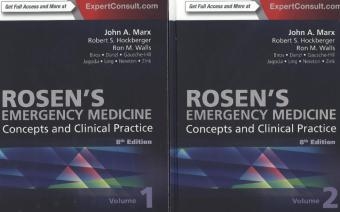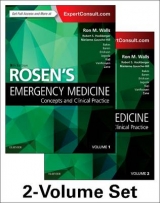
Rosen's Emergency Medicine - Concepts and Clinical Practice, 2-Volume Set
Saunders (Verlag)
978-1-4557-0605-1 (ISBN)
- Titel erscheint in neuer Auflage
- Artikel merken
2014 BMA Medical Book Awards Highly Commended in Medicine category!
Rely on Rosen's Emergency Medicine for the latest answers on every facet of emergency medicine practice. For decades, this medical reference book has set the standard in emergency medicine, offering unparalleled comprehensiveness, clarity, and authority - to help you put the latest and best knowledge to work for your patients in the ER.
Practice confidently with easily actionable, dependable guidance on the entire breadth of emergency medicine topics.
Get�expert guidance on how to approach specific clinical presentations in the ER. The "Cardinal Presentations Section" provides quick and easy reference to differential diagnosis and directed testing for fever in the adult patient; dizziness and vertigo; chest pain; and over 20 other frequently seen presentations in the emergency department.
Effectively apply the newest emergency medicine techniques and approaches, including evidence-based therapies for shock; high-cost imaging; evaluation and resuscitation of the trauma patient; cardiovascular emergencies; evaluation and risk stratification for transient ischemic attack (TIA) patients; and much more.
Locate the answers you need quickly thanks to a user-friendly, full-color design, complete with more illustrations than ever before.
Access the complete contents on the go from your laptop or mobile device at Expert Consult, fully searchable, with links to PubMed.
Your purchase entitles you to access the web site until the next edition is published, or until the current edition is no longer offered for sale by Elsevier, whichever occurs first. Elsevier reserves the right to offer a suitable replacement product (such as a downloadable or CD-ROM-based electronic version) should access to the web site be discontinued.
VOLUME 1
Part I. Fundamental Clinical Concepts
Section One. Critical Management Principles
1. Airway
2. Mechanical Ventilation and Noninvasive Ventilatory Support
3. Pain Management
4. Procedural Sedation and Analgesia
5. Monitoring the Emergency Patient
6. Shock
7. Blood and Blood Components
8. Brain Resuscitation
9. Adult Resuscitation
10. Pediatric Resuscitation
11. Neonatal Resuscitation
Section Two. Cardinal Presentations
12. Fever in the Adult Patient
13. Weakness
14. Cyanosis
15. Syncope
16. Depressed Consciousness and Coma
17. Confusion
18. Seizures
19. Dizziness and Vertigo
20. Headache
21. Diplopia
22. Red and Painful Eye
23. Sore Throat
24. Hemoptysis
25. Dyspnea
26. Chest Pain
27. Abdominal Pain
28. Jaundice
29. Nausea and Vomiting
30. Gastrointestinal Bleeding
31. Diarrhea
32. Constipation
33. Acute Pelvic Pain in Women
34. Vaginal Bleeding
35. Back Pain
Part II. Trauma
Section One. General Concepts
36. Multiple Trauma
37. Trauma in Pregnancy
38. Pediatric Trauma
39. Geriatric Trauma
40. Injury Prevention and Control
Section Two. System Injuries
41. Head Injury
42. Facial Trauma
43. Spinal Injuries
44. Neck
45. Thoracic Trauma
46. Abdominal Trauma
47. Genitourinary System
48. Peripheral Vascular Injury
Section Three. Orthopedic Lesions
49. General Principles of Orthopedic Injuries
50. Hand
51. Wrist and Forearm
52. Humerus and Elbow
53. Shoulder
54. Musculoskeletal Back Pain
55. Pelvic Trauma
56. Femur and Hip
57. Knee and Lower Leg
58. Ankle and Foot
Section Four. Soft Tissue Injuries
59. Wound Management Principles
60. Foreign Bodies
61. Mammalian Bites
62. Venomous Animal Injuries
63. Thermal Burns
64. Chemical Injuries
Section Five. Violence and Abuse
65. Forensic Emergency Medicine
66. Child Maltreatment
67. Sexual Assault
68. Intimate Partner Violence
69. Elder Abuse and Neglect
Part III. Medicine and Surgery
Section One. Head and Neck Disorders
70. Oral Medicine
71. Ophthalmology
72. Otolaryngology
Section Two. Pulmonary System
73. Asthma
74. Chronic Obstructive Pulmonary Disease
75. Upper Respiratory Tract Infections
76. Pneumonia
77. Pleural Disease
Section Three. Cardiac System
78. Acute Coronary Syndromes
79. Dysrhythmias
80. Implantable Cardiac Devices
81. Heart Failure
82. Pericardial and Myocardial Disease
83. Infective Endocarditis and Valvular Heart Disease
Section Four. Vascular System
84. Hypertension
85. Aortic Dissection
86. Abdominal Aortic Aneurysm
87. Peripheral Arteriovascular Disease
88. Pulmonary Embolism and Deep Vein Thrombosis
Section Five. Gastrointestinal System
89. Esophagus, Stomach, and Duodenum
90. Disorders of the Liver and Biliary Tract
91. Disorders of the Pancreas
92. Disorders of the Small Intestine
93. Acute Appendicitis
94. Gastroenteritis
95. Disorders of the Large Intestine
96. Disorders of the Anorectum
VOLUME 2
Section Six. Genitourinary and Gynecologic Systems
97. Renal Failure
98. Sexually Transmitted Diseases
99. Selected Urologic Disorders
100. Selected Gynecologic Disorders
Section Seven. Neurology
101. Stroke
102. Seizure Disorders
103. Headache Disorders
104. Delirium and Dementia
105. Brain and Cranial Nerve Disorders
106. Spinal Cord Disorders
107. Peripheral Nerve Disorders
108. Neuromuscular Disorders
109. Central Nervous System Infections
Section Eight. Psychiatric and Behavioral Disorders
110. Thought Disorders
111. Mood Disorders
112. Anxiety Disorders
113. Somatoform Disorders
114. Factitious Disorders and Malingering
115. Suicide
Section Nine. Immunologic and Inflammatory
116. Arthritis
117. Tendinopathy and Bursitis
118. Systemic Lupus Erythmatosus and the Vasculitides
119. Allergy, Hypersensitivity, Angioedema, and Anaphylaxis
120. Dermatologic Presentations
Section Ten. Hematology and Oncology
121. Anemia, Polycythemia, and White Blood Cell Disorders
122. Disorders of Hemostasis
123. Selected Oncologic Emergencies
Section Eleven. Metabolism and Endocrinology
124. Acid-Base Disorders
125. Electrolyte Disorders
126. Diabetes Mellitus and Disorders of Glucose Homeostasis
127. Rhabdomyolysis
128. Thyroid and Adrenal Disorders
Section Twelve. Infectious Diseases
129. Bacteria
130. Viral Illnesses
131. Rabies
132. HIV Infection and AIDS
133. Parasitic Infections
134. Tick-Borne Illnesses
135. Tuberculosis
136. Bone and Joint Infections
137. Skin and Soft Tissue Infections
138. Sepsis Syndrome
Part IV. Environment and Toxicology
Section One. Environment
139. Frostbite
140. Accidental Hypothermia
141. Heat Illness
142. Electrical and Lightning Injuries
143. Scuba Diving and Dysbarism
144. High-Altitude Medicine
145. Drowning
146. Radiation Injuries
Section Two. Toxicology
147. General Approach to the Poisoned Patient
148. Acetaminophen
149. Aspirin and Nonsteroidal Agents
150. Anticholinergics
151. Antidepressants
152. Cardiovascular Drugs
153. Caustics
154. Cocaine and Other Sympathomimetics
155. Toxic Alcohols
156. Hallucinogens
157. Heavy Metals
158. Hydrocarbons
159. Inhaled Toxins
160. Lithium
161. Antipsychotics
162. Opioids
163. Pesticides
164. Plants, Mushrooms, and Herbal Medications
165. Sedative Hypnotics
Part V. Special Populations
Section One. The Pediatric Patient
166. General Approach to the Pediatric Patient
167. Pediatric Fever
168. Pediatric Respiratory Emergencies: Upper Airway Obstruction and Infections
169. Pediatric Respiratory Emergencies: Lower Airway Obstruction
170. Pediatric Respiratory Emergencies: Disease of the Lungs
171. Cardiac Disorders
172. Gastrointestinal Disorders
173. Infectious Diarrheal Disease and Dehydration
174. Genitourinary and Renal Tract Disorders`
175. Neurologic Disorders
176. Musculoskeletal Disorders
Section Two. The Pregnant Patient
177. General Approach to the Pregnant Patient
178. Acute Complications of Pregnancy
179. Chronic Medical Illness during Pregnancy
180. Drug Therapy in Pregnancy
181. Labor and Delivery and Their Complications
Section Three. The Geriatric Patient
182. The Elder Patient
Section Four. The Patient with Compromised Immune Function
183. The Immunocompromised Patient
Section Five. The Patient with an Organ Transplant
184. The Solid Organ Transplant Patient
Section Six. The Alcoholic and Substance Abuse Patient
185. Alcohol-Related Disease
186. Substance Abuse
Section Seven. The Developmentally or Physically Disabled Patient
187. Evaluation of the Developmentally or Physically Disabled Patient
Section Eight. The Problem Patient
188. The Combative Patient
189. The Difficult Patient
Part VI. Emergency Medical Services
190. Emergency Medical Service: Overview and Ground Transport
191. Air Medical Transport
192. Tactical Emergency Medical Support and Urban Search and Rescue
193. Disaster Preparedness
194. Weapons of Mass Destruction
Part VII. The Practice of Emergency Medicine
195. Observation Medicine and Clinical Decision Units
196. Emergency Ultrasound
197. Process Improvement and Patient Safety
BONUS ONLINE CONTENT
Youth, Violence, and Street Gangs
Medical Literature and Evidence-Based Medicine
Multiculturalism and Care Delivery
Bioethics
End of Life
Emergency Medical Treatment and Active Labor Act and Medicolegal Issues
Wellness, Stress, and the Impaired Physician
| Zusatzinfo | Approx. 2600 illustrations (2600 in full color) |
|---|---|
| Verlagsort | Philadelphia |
| Sprache | englisch |
| Maße | 222 x 281 mm |
| Themenwelt | Medizin / Pharmazie ► Medizinische Fachgebiete ► Notfallmedizin |
| Medizin / Pharmazie ► Medizinische Fachgebiete ► Pharmakologie / Pharmakotherapie | |
| ISBN-10 | 1-4557-0605-1 / 1455706051 |
| ISBN-13 | 978-1-4557-0605-1 / 9781455706051 |
| Zustand | Neuware |
| Haben Sie eine Frage zum Produkt? |
aus dem Bereich



